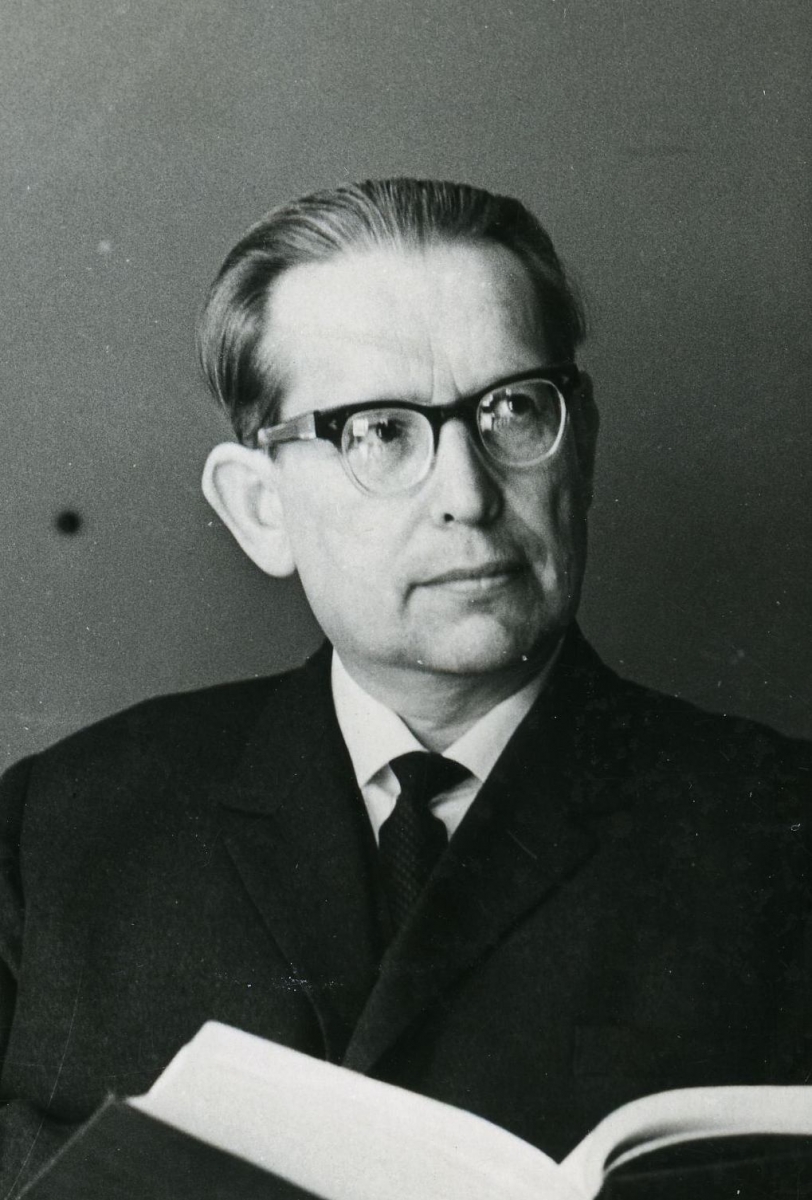
Paul Kuusberg
Paul Kuusberg (1916–2003) was an Estonian prose writer, critic and promoter of literature. He stood out on account of his novels dealing with issues from the recent past (the war and the Stalinist era) or his contemporary times.
He was born in Tallinn where he attended primary school, a vocational high school and Tallinn Maritime School. He then worked in construction and was an active member of a trade union, which he remained associated with in war time. Kuusberg got involved in politics: having joined the Communist Party of the Soviet Union, he became a political commissar in the Estonian Rifle Corps in 1940 and edited the corps newspaper Tasuja (‘Avenger’) while enlisted in the destruction battalions. In 1958 he graduated from the Higher Party School of the Central Committee of the Communist Party and became a member of the Central Committee of the Estonian Communist Party in 1960. His first involvement in literary activities was as the editor of the newspaper Rahva Hääl (1947–1957). Kuusberg’s subsequent literary and creative work was connected to the Estonian Writers’ Union, which he joined in 1950, and the magazine Looming. Initially (1954–1957), he was the prose consultant of the Writers’ Union, then (1960–1968) secretary of the board of the union, and finally (1976–1983) chairman. In the interim years (1957–1960 and 1968–1976) he was the editor-in-chief of Looming. Kuusberg is credited with maintaining the high artistic standard of Looming and a relatively liberal atmosphere in the Writers’ Union at a time when the social order imposed rigid political norms.
Kuusberg started publishing his journalistic writing and criticism in 1948 and became prolific in this field, while his first novel, Müürid (‘Walls’), appeared relatively late (1957). This debut work depicts how the mental development of construction workers was conditioned by communist ideas, and bears the stamp of social realism. The novel of linked stories Vabaduse puiestee (‘Liberty Alley’, 1971), deals with the same subject and follows the formative years of a young proletarian in the pre-war years of the republic. Kuusberg’s second novel Enn Kalmu kaks mina (‘The Two Me’s of Enn Kalm’, 1961) is a noticeably more self-contained work; together with Südasuvel (‘At the Height of Summer’, 1966) and Üks öö (‘One Night’, 1972), these three novels were regarded as innovative post-war works in the context of Soviet literature. The first depicts the combat and the mentality of the soldiers of the Estonian Rifle Corps; the second, that of the destruction battalions; and the last one gives a panorama of the mentalities of the Soviet activists evacuated to the home front. Although the treatment of history in these works tends to be one-sided, the dramatic tension of the war depiction is convincing.
The issues that Kuusberg deals with emerge from the contradiction between communist ideals and Soviet administrative reality. The characters, most of them of the author’s age, have to make complicated ethical choices, while the writer’s criticism targets primarily selfishness and careerism. The novel Andres Lapeteuse juhtum (‘The Case of Andres Lapeteus, 1963) was one of the first critical and convincing reappraisals of the stalinist era. It revolves around a character whose moral and human traits degenerate in proportion as he rises within the political system. The title character lies in a hospital bed after a tragic accident, his thoughts veering from weighing up his personal odyssey to justifying his behaviour. A similar grey-area situation and inner reflection are evoked in Vihmapiisad (‘Raindrops’, 1976), which is also considered the most representative work of Kuusberg’s prose.
Kuusberg’s short stories deal with similar subject matter, although the depiction is more condensed and at times humorous. The short stories Roostetanud kastekann (‘Rusty Watering Can’, 1970) and Võõras või õige mees (‘The Strange or Right Man’, 1977), which deal with society’s prevailing careerism and superficiality both received the Friedebert Tuglas Short Story Award.
I. S. (Translated by M. M.-K.)
Books in Estonian
Novels
Müürid. Tallinn: Eesti Raamat, 1957, 460 lk. [2. trükk: 1980 (Teosed, 6).]
Enn Kalmu kaks mina; (Inimesed sõdurisinelis). Tallinn: Eesti Raamat, 1961, 294 lk. [2. trükk: 1965; 3. trükk: 1978 (Teosed, 2).]
Andres Lapeteuse juhtum. Tallinn: Eesti Raamat, 1963, 236 lk. [Järgnevad trükid: 1966; 1978 (Teosed, 4), 2009.]
Südasuvel. Tallinn: Eesti Raamat, 1966, 327 lk. [2. trükk: 1977 (Teosed, 1).]
Vabaduse puiestee. Tallinn: Eesti Raamat, 1971, 168 lk. [2. trükk: 1980 (Teosed, 7).]
Üks öö. Tallinn: Eesti Raamat, 1972, 230 lk. [2. trükk: 1972, 3. trükk: 1978 (Teosed, 3).]
Vihmapiisad. Tallinn: Eesti Raamat, 1976, 230 lk. [2. trükk: 1979 (Teosed, 5).]
Short stories
Kes ta oli?. Tallinn: Perioodika, 1985, 54 lk.
Habemik. Tallinn: Eesti Raamat, 1985, 95 lk.
Kes nad olid?. Tallinn: Eesti Raamat, 1986, 252 lk.
Naeratus: jutustusi. Tallinn: Eesti Raamat, 1971, 166 lk.
Linnukesega. Tallinn: Perioodika, 1977, 79 lk.
Meie kiisul kriimud silmad…: neli lugu. Tallinn: Eesti Raamat, 1980, 128 lk.
Skandaal vanadekodus. Tallinn: Eesti Raamat, 1991, 229 lk.
Non-Fiction
Sõna sekka: kriitikat, vaidlusi, hinnanguid. Tallinn: Eesti Riiklik Kirjastus, 1959, 435 lk.
Ajast, maailmakodanikust ja muust. Tallinn: Eesti Raamat, 1967, 168 lk.
Tänan tähelepanu eest!. Tallinn: Eesti Raamat, 1988, 211 lk.
Rõõmud ja pettumused. Tallinn: Kupar, 1996, 286 lk.
Collected works
Teosed, 1. köide: Südasuvel. Tallinn: Eesti Raamat, 1977, 304 lk.
Teosed, 2. köide: Enn Kalmu kaks mina. (Inimesed sõdurisinelis). Tallinn: Eesti Raamat, 1978, 271 lk.
Teosed, 3. köide: Üks öö. Tallinn: Eesti Raamat, 1978, 223 lk.
Teosed, 4. köide: Andres Lapeteuse juhtum. Tallinn: Eesti Raamat, 1978, 238 lk.
Teosed, 5. köide: Vihmapiisad. Tallinn: Eesti Raamat, 1979, 208 lk.
Teosed, 6. köide: Müürid. Tallinn: Eesti Raamat, 1980, 399 lk.
Teosed, 7. köide: Novellid ja jutustused; Vabaduse puiestee. Tallinn: Eesti Raamat, 1980, 400 lk.
Teosed, 8. köide: Kriitika ja publitsistika. Tallinn: Eesti Raamat, 1980, 638 lk.



